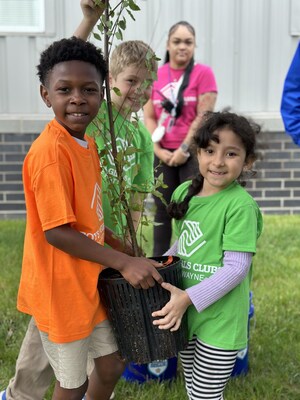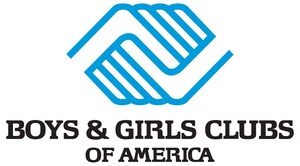As Effects of COVID-19 Crisis Deepen, Boys & Girls Clubs Announce Continued Fundraising Effort to Tackle Long-Term Impact on Youth
National non-profit providing critical support during uncertain times; doing "Whatever It Takes" and doubling down its mission to end cycles of inequity facing America's kids
ATLANTA, Sept. 3, 2020 /PRNewswire/ -- For 160 years, Boys & Girls Clubs have navigated times of crisis and uncertainty to serve kids and teens. As the nation endures continued uncertainty during the COVID-19 pandemic, long-term impacts are emerging for youth, families and communities, compounding the effects of urgent needs felt throughout the crisis.
Aligned with its mission, Boys & Girls Clubs are stepping up to address the continuation of urgent needs and leading the way to help youth and communities overcome the long-term impacts of the crisis. Through a continued COVID-19 fundraising effort, Boys & Girls Clubs will help overcome the prolonged effects of the crisis on youth safety and well-being, learning loss, and racial and social equity, while continuing to tackle the urgent needs that emerged at the onset of the crisis -- meals, childcare and virtual programming.
"Now more than ever, kids, families, and communities need Boys & Girls Clubs to support them during this pivotal time in our history. Under a sustained time of uncertainty, as the nation continues to navigate these times, Clubs are doing whatever it takes to create equity for all kids by providing access to services that promote wellbeing and academic programs to prevent learning loss," said Julie Teer, chief development and public affairs officer of Boys & Girls Clubs of America. "Galvanizing new support and rallying our stakeholders has never been more critical, because together our nation must do more to create a just, equitable, and inclusive future for our kids. It's our moral and ethical responsibility to build a better future for the next generation and we must start now."
Following the launch of the Boys & Girls Clubs COVID-19 Relief Fund in April, targeted to bringing critical meals, childcare and virtual programs to youth and families most in need, Boys & Girls Clubs of America seeks to galvanize continued support from the public and private sectors as the crisis continues and effects of the pandemic become even further reaching with concerning cumulative effects on youth health, education and equity in the long-term.
The Bank of America Charitable Foundation has joined Boys & Girls Clubs of America to help lead this fundraising effort. A partner with Boys & Girls Clubs since 1980, Bank of America has recently awarded a $1 million grant over two years to support a Boys & Girls Clubs of America tutoring program for youth ages 6 to 18 in select cities across the U.S. The initiative is an extension of Project Learn, a program that reinforces the academic enrichment and school engagement of young people during the time they spend at the Clubs.
"As education in America becomes increasingly challenged by the impacts of coronavirus, it is important to support organizations that can inspire educational gains among students who need them most," said Cynthia Bowman, chief diversity and inclusion and talent acquisition officer at Bank of America, and a member of the board of trustees for Boys & Girls Clubs of America (Midwest region). "We hope that this grant to Boys & Girls Clubs of America can further support the essential work they are doing to help level the playing field for kids, families and communities across the country."
Bank of America joins an impressive cadre of more than 22 corporate partners who supported initial relief efforts, commencing with a gift from The Coca-Cola Foundation. Recent partner commitments include Bridgestone, Grubhub, Papa John's, The Rite Aid Foundation, Red Nose Day, goPuff, Wells Fargo, The James M. Cox Foundation, Robert Half, Lenovo, SQ Medical Supplies, Michaels and FRThankYou.com.
These organizations have helped to open Club doors, provide technology to support virtual school and fund programs that are supporting workforce readiness for teens.
As the nation continues to grapple with the crisis, more than 3,800 Boys & Girls Clubs are ramping up programming and services to tackle three main long-term impacts of the crisis.
Supporting emotional well-being of youth and helping them overcome trauma
Economic disparities for families in communities around the country have left some of the country's most vulnerable youth populations even more imperiled. Three out of five children live in low-income families and almost half (45%) have experienced at least one potentially traumatic event in their lives.
The impact of COVID-19 exacerbates existing gaps in opportunities for young people, especially those in communities grappling with systemic inequity. Lack of access to technology, positive mentors and guidance, food accessibility and other critical factors are impacting kids in ways that could cause long-term setbacks and trauma for millions of young people.
Since the pandemic first impacted the United States in March, Boys & Girls Clubs worked to support the needs of kids, families and communities. Thousands of Clubs served youth and families of essential workers and other local Club members. Clubs also supported with in-person and virtual programming and nearly 1,800 Club's provided meal programs critical for food security.
Boys & Girls Clubs are now more critical for kids, families and communities than ever before. When young people attend high-quality youth development programs like Boys & Girls Clubs, they become resilient, build life skills and live healthy lifestyles. Club youth develop perseverance so they can face life's challenges. About 90% of Club members report that if something is hard, they keep working at it.
Stemming learning loss from prolonged out-of-school time and providing enrichment programs to keep kids on track
Each summer in America, an estimated 43 million children in the U.S. miss out on expanded learning opportunities that could prevent them from falling behind. For example, during summer, most youth lose about two months' worth of math skills. Low-income youth also lose more than two months' worth of reading skills, while their middle-class peers make slight gains. COVID-19 has likely and most certainly increased these numbers for kids and teens around the country.
More than half of the achievement gap between lower and higher income youth can be explained by unequal access to summer learning opportunities
With many schools offering hybrid schedules, or mostly virtual classes, Clubs role in supporting learning has never been more critical. Now and as school continues to return in communities around the country, Clubs will be open during school hours, and offering additional assistance and support, especially for those in need of a safe environment. Other Clubs will be assisting youth online in a virtual Club setting with homework help and social-emotional support. This continuous support from a caring Club staff is critical for millions of youth this fall, many without a parent at home during the day or a positive adult mentor in their lives.
Boys & Girls Clubs are also adapting their service models to support communities by meeting the most critical needs of kids and communities. Clubs are providing school supplies, activity kits, feeding programs; learning loss prevention and intervention programs; increased virtual integration; enhancement programs; as well as other assistance. Clubs are providing families with critical resources during the sustained period of uncertainty.
Advocating for Racial Equity to Diminish the Inequality Divide
Boys & Girls Clubs of America stands against racism and any type of discrimination. With 60% of Boys & Girls Club members identifying as Black, Latino, Asian, Native or other, the organization is committed to leveling the playing field because every young person, no matter who they are, where they come from, or the circumstances which surround them, should have equal access to opportunities and experiences that give them every opportunity to be successful in life.
Through the pandemic, and the elevation of systemic racism and calls for social justice, Clubs are at the forefront of providing opportunities for engagement, critical conversations and support for communities. Clubs are engaging and listening actively to ensure local Club staff and boards are well-trained in practices that address anti-racism, social justice and equity. Impacting youth around the country, 87% of Club youth report that they can stand up for what they think is right.
Local Clubs with Boys & Girls Clubs of America are now continuing to co-create inclusive and culturally relevant programs and resources that help close the opportunity gap while nurturing and elevating youth voice. In addition, Boys & Girls Clubs are developing policies and partner engagement that uphold principles of diversity, equity and inclusion.
To create significant and sustained change to realize racial equity, Boys & Girls Clubs are committed to speaking out and continuing to take action.
How You Can Help
Boys & Girls Clubs of America is asking for your support. Donating to Boys & Girls Clubs of America directly supports local impact by bolstering our work to build strong local Clubs and communities, increase the quality of every kid's Club experience, reach and serve more young people, and to advocate for America's youth at the local, state, and federal levels.
Please go to BGCA.org to donate or to learn how you can partner. Join us now in doing whatever it takes for America's kids.
About Boys & Girls Clubs of America
For 160 years, Boys & Girls Clubs of America (BGCA.org) has enabled young people most in need to achieve great futures as productive, caring, responsible citizens. Today, more than 4,700 Clubs serve 4.6 million young people through Club membership and community outreach. Clubs are located in cities, towns, public housing and on Native lands throughout the country, and serve military families in BGCA-affiliated Youth Centers on U.S. military installations worldwide. They provide a safe place, caring adult mentors, fun and friendship, and high-impact youth development programs on a daily basis during critical non-school hours. Club programs promote academic success, good character and citizenship, and healthy lifestyles. In a Harris Survey of alumni, 54% said the Club saved their lives. National headquarters are located in Atlanta. Learn more about Boys & Girls Clubs of America on Facebook and Twitter.
SOURCE Boys & Girls Clubs of America

Related Links
WANT YOUR COMPANY'S NEWS FEATURED ON PRNEWSWIRE.COM?
Newsrooms &
Influencers
Digital Media
Outlets
Journalists
Opted In






Share this article